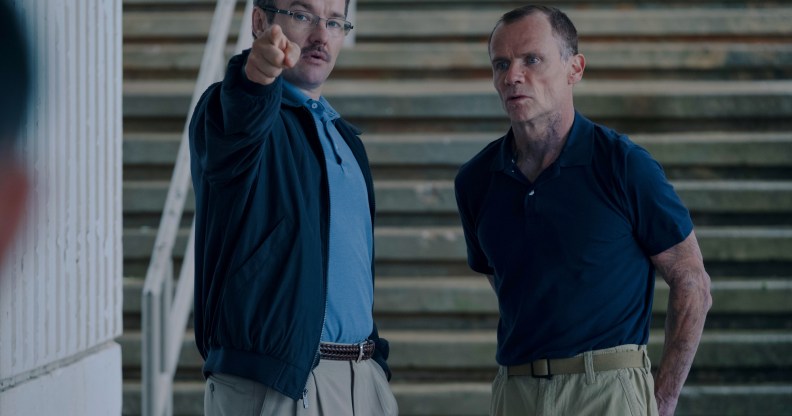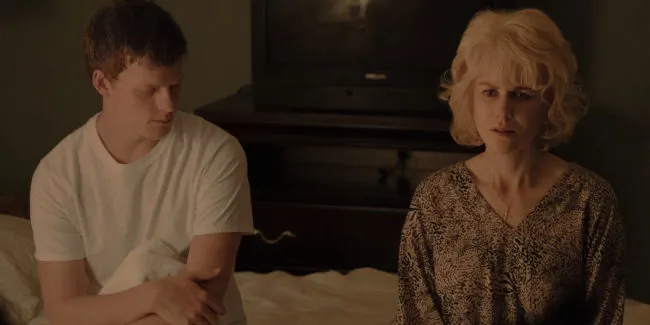Boy Erased: How Joel Edgerton became the model LGBT ally

Joel Edgerton directing a scene for Boy Erased. (Universal)
“I do acknowledge some people say I should not have made the film,” Boy Erased actor-director Joel Edgerton tells PinkNews. “But I’m very proud that I did.”
Edgerton, the Golden Globe-nominated star of The Great Gatsby and Loving, is talking about his latest film, Boy Erased, a gay conversion therapy drama that he directed, wrote and stars in.
Boy Erased is based on the true story of conversion therapy survivor Garrard Conley, who, as a teenager, was sent to a Christian conversion camp to cure him of his homosexuality. It didn’t work. Conley wrote about his harrowing experiences in a 2016 memoir—which serves as the source material for Edgerton’s script.
Conley’s book landed on Edgerton’s reading list by way of Anonymous Content producer Kerry Kohansky Roberts and his own agent, who had just moved to Anonymous. Knowing that Edgerton was on the lookout for material for his second feature-length directorial effort—after 2015’s excellent horror film The Gift—“they conspired to give me the book,” he says.
Edgerton devoured the book, but was not sure it was the right project for him. “I didn’t feel, on a representation level, that I had the right to be the writer-director of the story,” he says. “Then I was obsessing about the book—thinking about it, ruminating on it, every day.”
During a two-week break from shooting the Jennifer Lawrence-starring thriller Red Sparrow in Budapest in early 2017, Edgerton found himself writing a couple of scenes based on Conley’s book. Then a whole screenplay. Then he knew he had to make it.
“I do acknowledge some people say I should not have made the film. But I’m very proud that I did.”
— Joel Edgerton
Boy Erased is one of few LGBT+ movies to receive major studio backing—it was released by Universal Pictures through its subsidiary, Focus Features—and boasts a star-studded cast including Oscar-nominated actor Lucas Hedges, playing Jared Eamons, based on Conley, Oscar winners Nicole Kidman and Russell Crowe as his conservative Christian parents, and a supporting cast that boasts pop star Troye Sivan, Joe Alwyn, Xavier Dolan and Cherry Jones.
But Edgerton says it wasn’t, as is often the way, a case of a billion-dollar studio haphazardly throwing millions to fund the production: The film got made because of Edgerton. The writer-director got acting commitments from his A-list stars—Hedges, Kidman and Crowe—and then shopped the film around. “I was like, I’m going to give them no reason to say no to me.”
Edgerton also cast himself in Boy Erased, playing the enigmatic leader of Christian conversion ministry, Love in Action, Victor Sykes. The role is based on John Smid, the real-life ex-conversion therapist who has since denounced his work and is now married to a man.
Edgerton met Smid as part of his research for the film—and decided that he himself wanted the complex task of trying to play this conflicted, flawed character. “I was struck by his charisma, his intelligence, his ability to feel warm and mentorly … Here’s this guy who’s not all fire and brimstone and evil at first. He’s a big brother mentor. That kind of charismatic personality, to me, is terrifying.”

Lucas Hedges and Nicole Kidman in Boy Erased, directed by Joel Edgerton. (Universal)
Joel Edgerton: Lessons in representation and allyship
Edgerton is well aware of his privilege as a white, cisgender, heterosexual man. So, why was he the right person to direct a topic as emotionally wrought, and deeply personal, as gay conversion therapy?
“In the early stages, I was the one keeping myself away from sitting in the director’s chair,” says the Australian star. “I abandoned my reticence because I felt like—not that I used the term ally at the time, but now I do—but I was essentially [an ally].
“I felt like a very passionate ally. [I was] obsessed about this. You ever have that feeling that you have something you want to say in front of a table full of people and then go home and you’re like, Fuck, I never got to say that thing? It’s like unfinished business.”
Edgerton’s allyship manifested in his commitment to representation of the LGBT+ community in front of and behind the camera. Boy Erased features not only Sivan, but openly gay actor-director Xavier Dolan, openly lesbian veteran star Cherry Jones, and a wealth of supporting queer actors. And behind the scenes, “I had a great support team of representation in terms of the LGBTQ community,” Edgerton says.
Offering a lesson in allyship to fellow filmmakers entering LGBT+ territory, Edgerton says the script was submitted for approval to GLAAD, the organisation that campaigns for visibility of LGBT+ people in media, and he worked closely with Conley.
Edgerton says he made sure “Garrard read every significant draft of the script, that I listened to his notes and made additions, corrections and alterations according to his feelings. I had a beautiful email that he sent me about casting and representation, which I listened to. It was nice to see that he was going, ‘I trust you.’”
Of course, representation of queer actors playing queer characters is so important, but Edgerton posits an interesting theory: “I have many, many friends who are [gay] … obviously I’m not going to out anybody. I like to think of [acting] as an elevated art form—and you assume in an elevated community of artists that there’s a great liberal, open attitude.
“Yet the culture that permeates actors and the coming out of actors is still a limiting thing, all dictated by the perception that a studio may not hire you, or people may judge, your audience may be diminished because they judge you because of your sexuality—‘I don’t want to see a movie with that guy if he’s gay.’”
“There are different levels of coming out in the acting community.”
— Joel Edgerton
Edgerton says it’s cause and effect: The more roles for LGBT+ actors, the more it’s normalised, he says, pointing to his own casting of Sivan (“I was really fascinated with discovering more about Troye Sivan’s abilities as an actor”), Dolan and Jones. “They’re three people in the film who represent as LGBTQ, who are our heroes because they aren’t afraid, they are outspoken.”
“There are different levels of coming out in the acting community. Some might just be out to their friends, their agent, or whatever, but they’re like, ‘Don’t tell the world.’ And it’s such a shame,” says Edgerton.
“If representation changes in terms of who’s playing roles in LGBTQ movies, then it sends a great message out there to anyone else who’s on a fence—‘I feel more confident coming out because people will hire me, that judgement is being dismantled.’’’
Boy Erased is released in UK cinemas on February 8.

